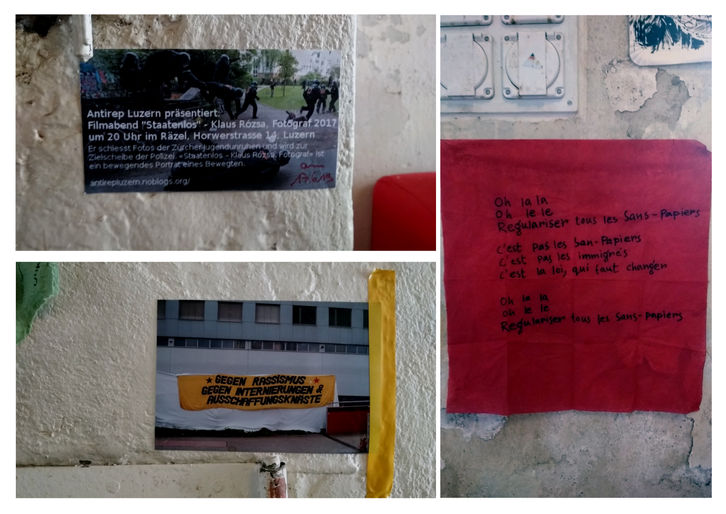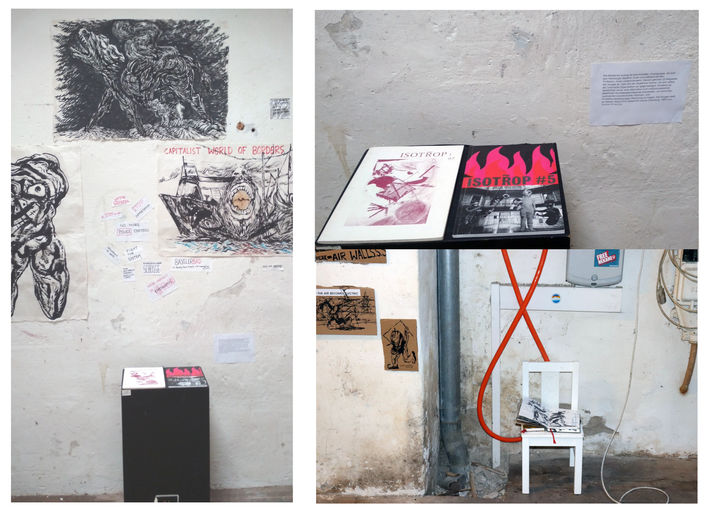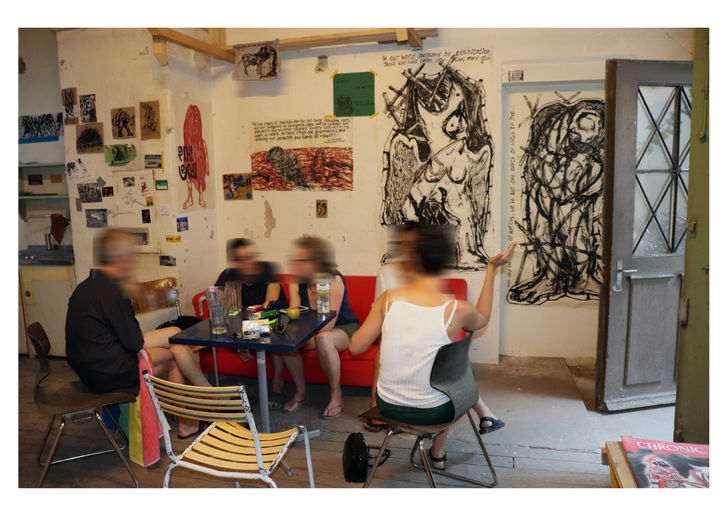All Corpses Are Borders
Title: All Corpses Are Borders (2019)
Open Day display for a Residency program in Switzerland, Part of Emerging Artist Award, Supported by FICA and Pro Helvetia, April to June 2019.
Special thanks to Kadiatou Diallo (Artist, academics, curator) for guiding and connecting with other practitioners throughout this residency period; Jan Bachmann (Comic Novelist, artist, Activist) for helping me conceptually and physical engagement with different political struggles in Switzerland, more specifically in Basel; Parvez Imam organizing the public presentation of my work at "the Dialogue", Basel and Hochschule Luzern, Design & Kunst, Lucerne School of Art and Design for organising my presentation of my work in University.
Site: 74/76 Mattenstrasse, Basel, Switzerland.
Dimension: Variable.
Media: painted banners, posters by black pigment bind with distemper and red, blue and brown Stainer on handwoven and rough cotton cloth, painted illustrations by gouache and Ink on rice-paper, permanent marker and ink drawings on printed flyers, leaflets, postcards, packing boxes cardboard sheets, tobacco packet and paper egg crate; handwritten text on the wall, collected propaganda materials related to immigration, racism, asylum, deportation, such as magazines, books, leaflets, stickers, flyers and badges; performative activities and discussions.
Description:
During the three months stay in Switzerland, I was engaged with different political groups, alternative publishing houses, community centres, squat houses, demonstrations mainly revolving around the question of immigration, asylum acts, deportation and racism. These themes were particularly roused in light of the recent “new asylum act’’ implemented in March 2019 in Switzerland.
I had many opportunities to get involved in political activities, which included:
The May Day (labour day) demonstrations on 1st May; occupying the parks on a mass scale beside the deportation camps in Zurich (against the Frontex/European Border and Coast Guard Agency, in collaboration with the Swiss Government)
A feminist strike on14th June.
New asylum act protest of 29th & 30th June in Basel.
I collected flyers, advertisements and media from the local art scene and noticed that topics like the recent immigration/asylum policies, deportation and racism were virtually absent. Through reading local news, conversations and engaging with different political groups in the area, and looking at counterpropaganda practices like protest sticker culture and underground/alternative magazines and newsletters, I decided to superimpose political imagery, slogans and quotations onto the collected material such as display boards and walls. These works and reflections were incomplete and thus ongoing.
The displays were set up in Mattenstrasse in a residential community, where people live within an economically independent and self-sustainable society. They have their own medical system, food procurement and storage, local entertainment and meeting places such as bars, a concert hall, and artist studios. Residents of this community are actively involved with political movements and my engagement with them provided me with a chance of immersing myself and gaining the first-hand experience with how the locals engage and protest police brutality and injustice against immigrants and asylum seekers.
This finally led to a public display being opened up which collected my works and engagements during the research and included, for example, a series of documentations of the demonstrations, sticker and magazine collections, contributions of other artist’s work such as Sussane Winterling’s “ISOTROP’’ (volumes 1 and 5) which was an underground collectives magazine publication of Germany. We also displayed anti-asylum act placards, posters, banners and stickers. I kept a daily journal which consisted of sketches, paintings, slogans, documentations, newspaper and magazine clippings and notes on my daily observations. Display space was created to exhibit my observations which allowed people who were affected by or involved with the political hardships and encouraged dialogue, enabling a greater sense of unity and understanding.



















